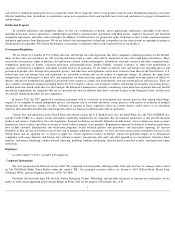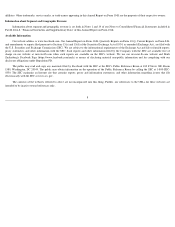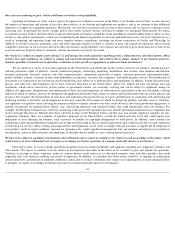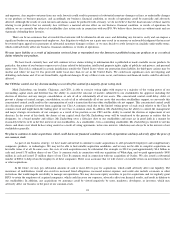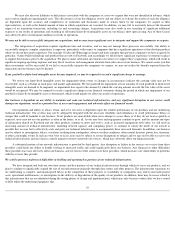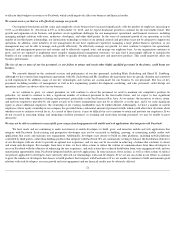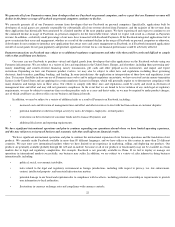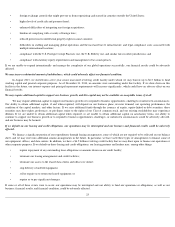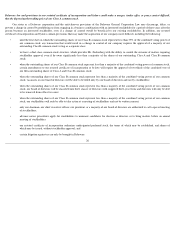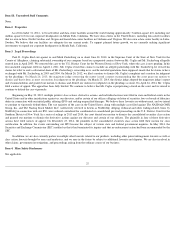Facebook 2014 Annual Report Download - page 20
Download and view the complete annual report
Please find page 20 of the 2014 Facebook annual report below. You can navigate through the pages in the report by either clicking on the pages listed below, or by using the keyword search tool below to find specific information within the annual report.
If we are unable to protect our intellectual property, the value of our brands and other intangible assets may be diminished, and our business may be
adversely affected.
We rely and expect to continue to rely on a combination of confidentiality, assignment, and license agreements with our employees, consultants,
and third parties with whom we have relationships, as well as trademark, copyright, patent, trade secret, and domain name protection laws, to protect our
proprietary rights. In the United States and internationally, we have filed various applications for protection of certain aspects of our intellectual
property, and we currently hold a number of issued patents in multiple jurisdictions and have acquired patents and patent applications from third parties.
In addition, in the future we may acquire additional patents or patent portfolios, which could require significant cash expenditures. Third parties may
knowingly or unknowingly infringe our proprietary rights, third parties may challenge proprietary rights held by us, and pending and future trademark
and patent applications may not be approved. In addition, effective intellectual property protection may not be available in every country in which we
operate or intend to operate our business. In any or all of these cases, we may be required to expend significant time and expense in order to prevent
infringement or to enforce our rights. Although we have generally taken measures to protect our proprietary rights, there can be no assurance that others
will not offer products or concepts that are substantially similar to ours and compete with our business. In addition, we regularly contribute software
source code under open source licenses and have made other technology we developed available under other open licenses, and we include open source
software in our products. For example, we have contributed certain specifications and designs related to our data center equipment to the Open Compute
Project Foundation, a non-
profit entity that shares and develops such information with the technology community, under the Open Web Foundation
License. As a result of our open source contributions and the use of open source in our products, we may license or be required to license or disclose
code and/or innovations that turn out to be material to our business and may also be exposed to increased litigation risk. If the protection of our
proprietary rights is inadequate to prevent unauthorized use or appropriation by third parties, the value of our brands and other intangible assets may be
diminished and competitors may be able to more effectively mimic our products, services, and methods of operations. Any of these events could have an
adverse effect on our business and financial results.
We are currently, and expect to be in the future, party to patent lawsuits and other intellectual property rights claims that are expensive and time
consuming, and, if resolved adversely, could have a significant impact on our business, financial condition, or results of operations.
Companies in the Internet, technology, and media industries own large numbers of patents, copyrights, trademarks, and trade secrets, and
frequently enter into litigation based on allegations of infringement, misappropriation, or other violations of intellectual property or other rights. In
addition, various "non-
practicing entities" that own patents and other intellectual property rights often attempt to aggressively assert their rights in order
to extract value from technology companies. Furthermore, from time to time we may introduce or acquire new products, including in areas where we
historically have not competed, which could increase our exposure to patent and other intellectual property claims from competitors and non-
practicing
entities.
From time to time, we receive notice letters from patent holders alleging that certain of our products and services infringe their patent rights. We
presently are involved in a number of intellectual property lawsuits, and as we face increasing competition and gain an increasingly high profile, we
expect the number of patent and other intellectual property claims against us to grow. Defending patent and other intellectual property litigation is costly
and can impose a significant burden on management and employees, and there can be no assurances that favorable final outcomes will be obtained in all
cases. In addition, plaintiffs may seek, and we may become subject to, preliminary or provisional rulings in the course of any such litigation, including
potential preliminary injunctions requiring us to cease some or all of our operations. We may decide to settle such lawsuits and disputes on terms that are
unfavorable to us. Similarly, if any litigation to which we are a party is resolved adversely, we may be subject to an unfavorable judgment that may not
be reversed upon appeal. The terms of such a settlement or judgment may require us to cease some or all of our operations or pay substantial amounts to
the other party. In addition, we may have to seek a license to continue practices found to be in violation of a third party's rights, which may not be
available on reasonable terms, or at all, and may significantly increase our operating costs and expenses. As a result, we may also be required to develop
alternative non-infringing technology or practices or discontinue the practices. The development of alternative non-
infringing technology or practices
could require significant effort and expense or may not be feasible. Our business, financial condition, and results of operations could be adversely
affected as a result of an unfavorable resolution of the disputes and litigation referred to above.
We are involved in numerous class action lawsuits and other litigation matters that are expensive and time consuming, and, if resolved adversely,
could harm our business, financial condition, or results of operations.
In addition to intellectual property claims, we are also involved in numerous other lawsuits, including putative class action lawsuits, many of
which claim statutory damages and/or seek significant changes to our business operations, and we anticipate that we will continue to be a target for
numerous lawsuits in the future. Because Facebook has over a billion users, the plaintiffs in class action cases filed against us typically claim enormous
monetary damages even if the alleged per-user harm is small or non-
existent. In addition, following our acquisition of Oculus, we may be subject to
additional class action lawsuits based on product performance or other claims related to the use of consumer hardware and software, as well as virtual
reality technology and products, which are new
17


